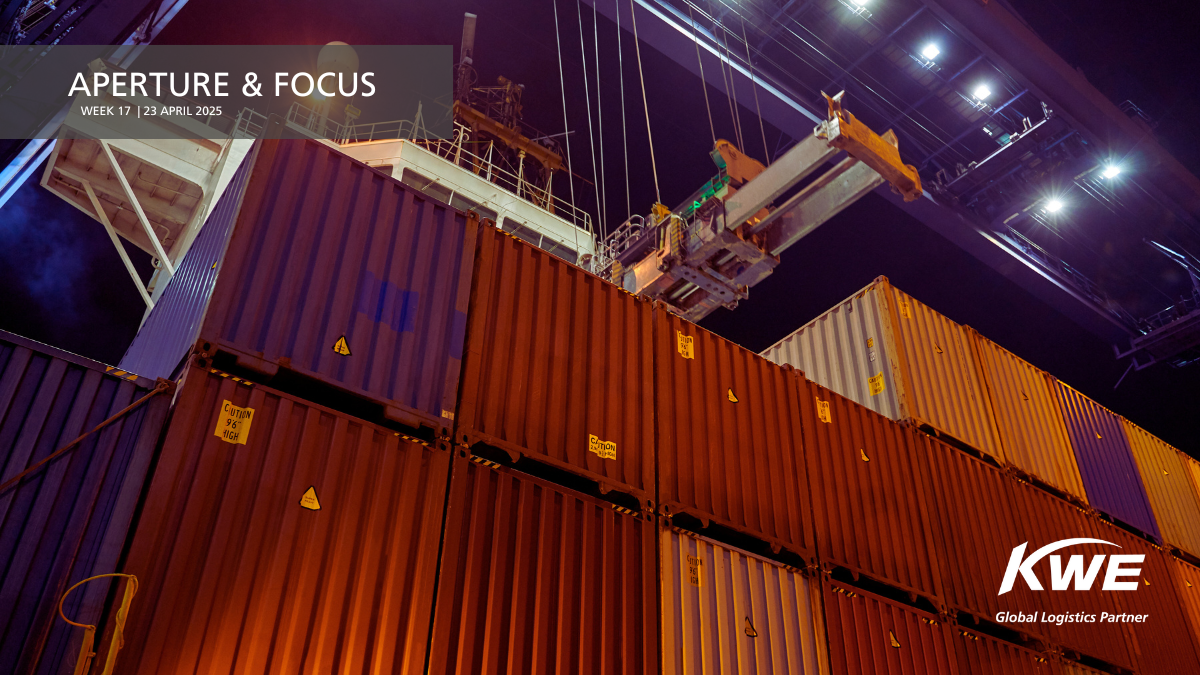Quote
Aperture & Focus 2025: Week 17

Global Aperture
China and Germany have signed the UN Convention on the Contract for the International Carriage of Goods by Rail, joining the Netherlands and Togo in supporting a unified legal framework for rail freight. The Convention aims to reduce administrative complexity and legal fragmentation by bridging Eastern and Western regulatory systems, making international rail transport more efficient and cost-effective across Europe and Asia.
Container shipping on the transpacific trade lane is experiencing a sharp decline due to escalating U.S.-China tariffs. In response, carriers are blanking sailings at rates not seen since early 2020. More than 80 blank sailings were reported in April 2025, with scheduled vessel capacity from Asia to the U.S. East and West Coasts down significantly.
Airports throughout the Middle East and Asia-Pacific have finalized plans to undergo major expansion between 2025 and 2035, focusing on both upgrading existing hubs and constructing new ones. These projects aim to add capacity for 1.24 billion passengers and 78 million US tons of cargo, enhancing the regions’ infrastructure to support rising demand for air travel and global trade.
Regional Focus
Americas
United States: The International Monetary Fund has revised its 2025 growth forecast for the United States downward to 1.8%, citing recent tariff hikes and increased policy uncertainty. The IMF warned that the escalating trade tensions and higher import costs will slow global growth, push U.S. inflation to 3%, and ultimately harm long-term economic prospects for all regions.
The U.S. government has finalized a plan to impose fees on Chinese-built vessels calling at U.S. ports. Set to begin later this year, the phased fee schedule is intended to address what the U.S. Trade Representative considers unfair competitive advantages, with some exemptions for bulk cargo, U.S. territories, and vessels with pending U.S. shipbuilding orders.
U.S. importers are looking to leverage foreign trade zones (FTZs) and bonded warehouses to manage the impact of tariffs. Interest in FTZ programs has surged, especially among retail, automotive, and electronics firms seeking to delay or reduce customs duties while monitoring evolving tariff policies. These duty-free zones allow companies to store or manufacture products without paying tariffs unless the goods enter the U.S. market.
More information on the latest U.S. tariff updates can be found in KWE’s latest Customer Advisory.
On April 15th, the South Carolina Ports Authority announced the completion of upgrades at Wando Welch Terminal, enabling the Port of Charleston to handle three mega containerships simultaneously at any tide. The new reinforced steel toe wall and berth deepening project allows the terminal to support higher container throughput and inland rail volumes.
Mexico: In February, Mexico was the largest trade partner of the United States based on total two-way trade volume, driven by strong demand for auto parts, computers, and vehicles. Port Laredo ranked as the third-largest U.S. trade gateway, handling $27.8 billion in commerce, with elevated trucking demand compared to the same period last year.
Brazil: On April 17th, Brazil became the first country in the Americas to fully adopt the electronic air waybill (eAWB), eliminating the need for physical documentation in air cargo shipments. The move is expected to improve clearance times and reduce paperwork.
Asia-Pacific
Japan: Port operations nationwide were disrupted on April 20th due to a nationwide dockworker strike, the first in six years. Additional 24-hour strikes are scheduled for April 26th, 27th, and May 11th, raising concerns about cargo backlogs and increasing pressure on international supply chains amid stalled labor negotiations.
Hong Kong: Hong Kong International Airport’s (HKG) largest independent cargo handler has been awarded the highest “Operating Status” in IATA’s new Security Management System (SeMS) certification program. The recognition follows an in-depth audit of Hong Kong Air Cargo Terminals Limited (HACTL)’s security protocols, operational processes, and risk management practices.
Europe, Middle East & Africa
The European Commission has launched a surveillance task force to monitor containerized imports from China, anticipating potential trade diversion due to recent U.S. tariffs. While Chinese exports to the U.S. have sharply declined, Europe is preparing for a possible influx of redirected Chinese goods. Officials warn that a surge in shipments could strain ports, create a shortage of containers, and disrupt supply chains—particularly if volumes begin rising in early June.
Belgium: Liege Airport surpassed the global air cargo growth average of 3% by processing over 326,283 US tons of cargo in Q1 2025. The airport saw a 42% rise in exports to North America and maintained stable operations despite global trade uncertainty and shifting demand.